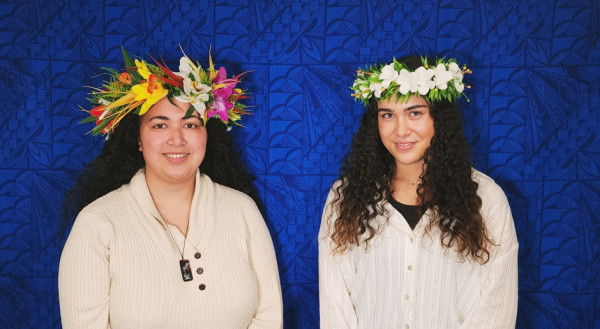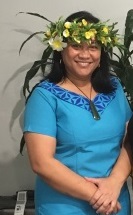6 June 2023
Shining a spotlight on staff working on our Pacific Programme
Our staff come from a wide range of different backgrounds and bring with them unique knowledge and experiences. This week, we shine the spotlight on three Pasefika women doing awesome things in our Pacific Development Programme.
Alisha Paotonu – Senior Adviser Pacific Programme

(L-R): Senior Adviser Pacific Programme Alisha Paotonu and National Pasefika Coordinator Lenia Toomaga Tapuai
Alisha is a proud Pasefika woman of Tongan,Samoan, and Niuean descent. With a criminology degree from Victoria University of Wellington, she started at Ara Poutama Aotearoa in October 2020 as part of the Tupu Toa internship programme.
“I was originally interested in working in the criminal justice system because of my grandfather,” says Alisha. “He was a Police Officer in Samoa, and then came to New Zealand as one of the first Samoan members of the New Zealand Police Force. He worked here for over 20 years and made Detective Sergeant. He was the one who suggested I try criminology.”
Alisha began her time at Corrections in the National Operations team and has since been in a variety of different roles, primarily working as an analyst. “My favourite thing about working for Corrections is that it is so big that you can go anywhere. I have been in so many different teams and it has been great to get that experience while I’m young.”
In her current role as Senior Adviser, Alisha is working on a research and engagement piece, titled ‘The Current State of Pasefika & Ara Poutama Aotearoa’. The report has a specific focus on Pasefika staff, looking into how Pasefika services are running, and Pasefika staff wellbeing.
While the piece of work is huge, Alisha has found herself continually inspired. “One thing that has stood out for me is the motivation and dedication of our Pasefika staff. The piece in a lot of ways has been a reality check. A lot of things happen in our communities that we don’t see. There are people working here who do everything they can to protect our communities and keep us safe.”
As well as her research work, Alisha is also an active member of the Pasefika Network at National Office. When Alisha first started, the network did not exist, and she found it challenging to find support as a Pasefika person. “It can be daunting as an intern in the public sector, and I was hungry to be able to see what support there was,” says Alisha. The launch of the National Office Pasefika Network provided a dedicated space for Pasefika people to come together through regular meetings, and it aims to help create a support network.
“It has been great to be able to share experiences and have a network of support when dealing with challenges." Sometimes, assumptions can be made due to lack of cultural understanding, and Alisha finds it helpful to discuss her experiences with others. “Even though I live alone, I have a lot of responsibility – my uncle, grandma, grandma’s sister, other grandma, my church, doing things with my family. But sometimes the broad assumption is that you don’t have responsibilities. In Pacific culture, you have responsibilities to your family and must balance them alongside getting your work done.”
Despite these challenges, Alisha remains passionate about her work. “I think we have something special to contribute in the way we work and to Ara Poutama Aotearoa and our people.”
Lenia Toomaga Tapuai – National Pasefika Coordinator
Lenia started with Corrections in 2022, also as part of the Tupu Toa internship program. Lenia worked within the High-Risk Response team and shifted to the Pasefika Programme team in April.
Lenia’s role involves supporting the Programme Manager Pacific in the work related to the Pacific Programme, coordinating advice to the Department regarding Pasefika practice, insights and experience as well as supporting the external relationships with sector wide partners. She is also responsible for the coordination of travel to the Pacific and of visiting delegations from the Pacific.
Like Alisha, Lenia also studied criminology. Before starting her internship, the only information she had about Corrections was from the media and her criminology studies. However, staff she met made her feel like she was in an environment where she could create positive change. “Growing up in a lower socio-economic area and seeing those around me grow up on the back foot of society made me choose criminology as my choice of degree,” says Lenia. “In Samoa, we have a value called tautua, which means service and giving back. I feel like my place in Corrections is to help my people and show appreciation for my family for coming over from Samoa for a better life and opportunities.”
Although she is new to the role, Lenia is loving working on the Pacific Programme. As for the future, while she has a lot she wants to achieve, Lenia is keen to keep pursuing work in this area and enjoys being able to see the impact of her work.
Rita Ale - Operational Support Manager

Before working for Ara Poutama Aotearoa, Rita was the Chief Probation Officer at Samoan Corrections. Rita visited Ara Poutama Aotearoa in 2007, as part of a work attachment. At the time, Ara Poutama Aotearoa was working with Samoan Corrections as part of an institutional strengthening programme.
Rita moved to New Zealand in 2009 to begin working with us. This move was not only to seek better education opportunities for her children, but also because she is truly passionate about helping people and influencing others to make changes for themselves and their communities.
Rita is currently a Tier 5 Manager at Hawke’s Bay Regional Prison. She is also the Deputy Chair of the Inclusion and Diversity Council. Rita acknowledges that the pathway to leadership is through service and for her, service means doing the work with passion and joy in your heart. Like Lenia and Alisha, Rita also achieved undergraduate and postgraduate degrees from Universities in Fiji and Australia majoring in Psychology and Criminal Justice.
Rita is open about the road ahead as we embark on transformational change. “There are a lot of challenges in navigating different pathways,” says Rita. “Pasefika staff can sometimes face the challenges of conscious and unconscious bias within Ara Poutama Aotearoa. We are sometimes seen as being the default people to do translation, help with Pacific people in prison or engage with Pacific communities, at times without appropriate acknowledgement or compensation. In some situations, Pasefika people can be seen as the muscle because of the way they look, rather than looking beyond their physique in terms of other potentials to develop.” As Ara Poutama Aotearoa has a diverse workforce, including staff with English as their second language, Rita would like to see a focus on cultural competencies for leaders and more awareness training for leaders to support staff from all walks of life.
“Hōkai Rangi allows us to explore these issues, but progress can be slow,” says Rita. Rita is passionate about helping staff be recognised for their work so they can feel safe, valued, and supported.
Rita is grateful to leaders who have supported her journey, and who have seen her value and capability. She has worked with leaders who inspired her and leaders she would not like to follow. “Despite the challenges, I am here to serve because I know that the way to influence positive change is through leadership,” says Rita.
Ready to make a move?
Start your journey - check out the a list of our current opportunities then apply online today!